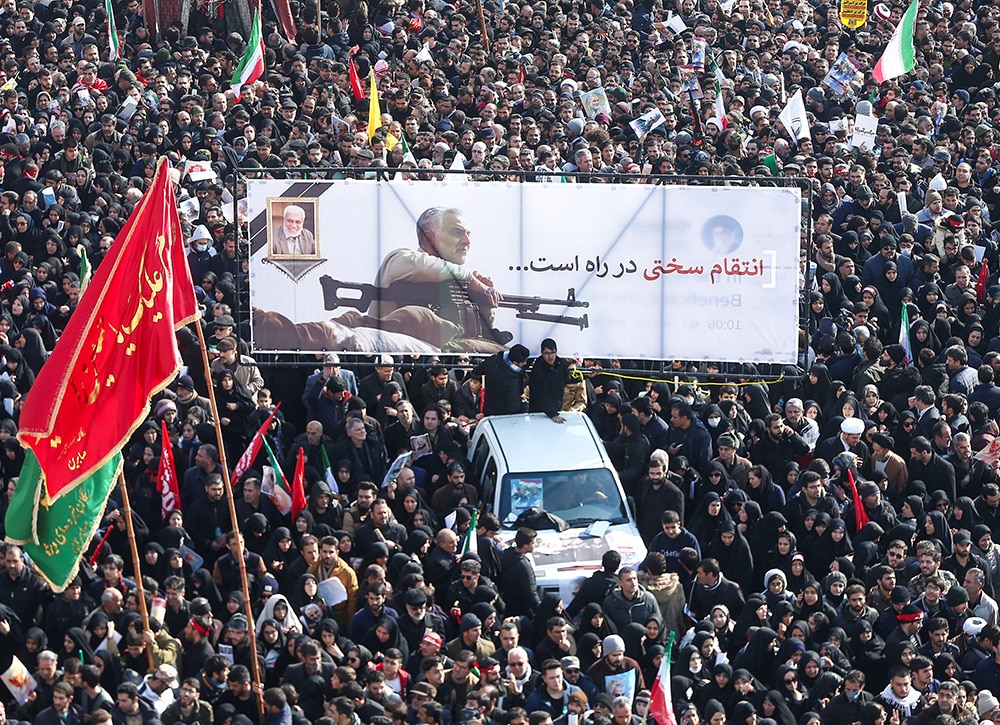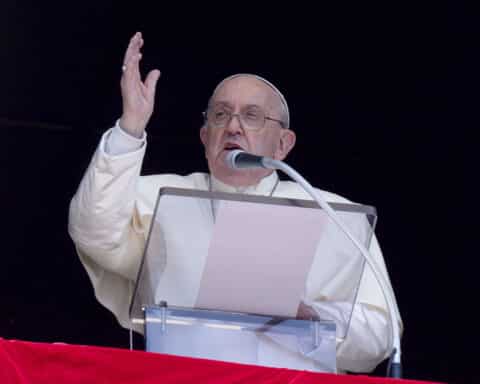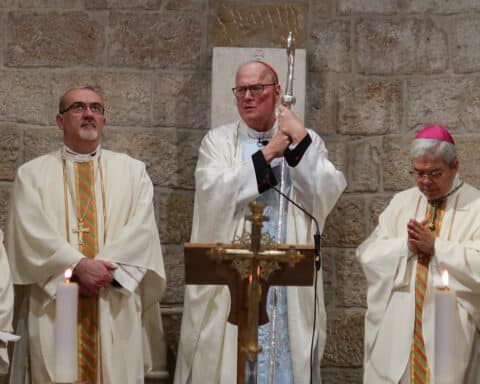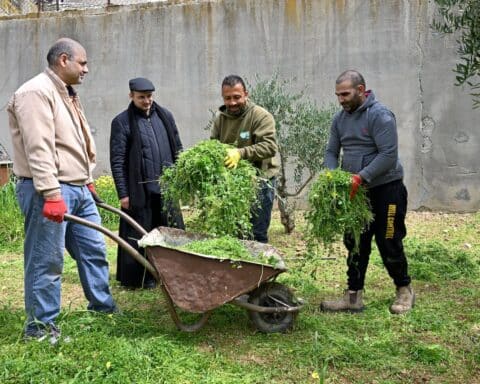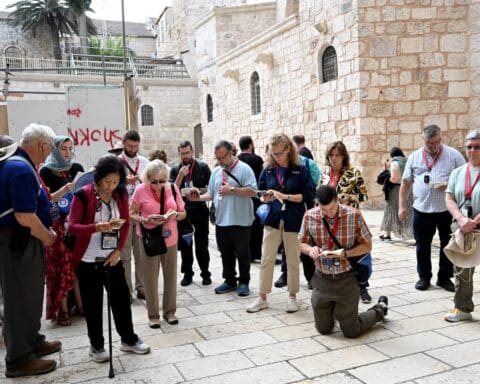A war between the United States and Iran seems to have been averted for now, but the Persian Gulf remains on edge as political and military leaders in Tehran and Washington, D.C., exchange terse messages and open-ended threats of future violence in the region.
Caught between the saber-rattling and high-stakes geopolitical maneuvering are vulnerable Christian communities and other religious minorities in neighboring Iraq and Syria who have suffered the brunt of war for nearly two decades.
“I think no one is safe. But Christian communities and other religious minorities will remain the most vulnerable,” said Steven P. Millies, an associate professor of public theology and director of the Bernardin Center at the Catholic Theological Union in Chicago.
Even though both the United States and Iran have taken steps to de-escalate tensions, Millies and other Catholic scholars told Our Sunday Visitor that the political situation remains extremely volatile less than two weeks after the United States killed Iranian Gen. Qassem Soleimani in a Jan. 3 drone strike.
“In all, we have lived to tell the tale after we came dangerously close to something very serious,” Millies said. “It may look like very little has changed, but I do not necessarily think that is the case.”
An unstable situation
Soleimani’s killing just outside the Baghdad International Airport raised initial concerns of a regional war between the United States and Iran, but the prospects for combat have dimmed since Iran responded with a barrage of missiles at two bases in Iraq that housed U.S. troops.
The Jan. 5 barrage inflicted no casualties and was seen as an attempt by the Iranian regime to prevent the conflict from escalating out of control. The next day, President Donald Trump embraced the de-escalatory off-ramp in a speech from the White House where he said Iran was “standing down.”
However, the situation remains unpredictable, as reports from the Persian Gulf indicate that Iranian military leaders have vowed to avenge Soleimani’s death and to continue his strategy of using “asymmetrical warfare” and proxy forces to attack U.S. troops with the ultimate goal of expelling them from the region.
“Depending on how this all plays out, it could have very extreme results for the area,” said Maryann Cuisamano Love, professor of international relations at The Catholic University of America.
Love told Our Sunday Visitor that a precipitous withdrawal of U.S. forces from Iraq — a longstanding goal of Iran — could create the kind of security vacuum that enabled the rise of the Islamic State, known as ISIS.
“While it’s good that both sides have sought de-escalation, and for the first time in a long time we’ve heard the word ‘dialogue’ in this context, the fact of the matter is that it’s still an extremely fragile situation,” Love said.
Fostering extremism
Dan Lindley, a political science professor at the University of Notre Dame and associate director of the Notre Dame International Security Center, said the potential destabilization in the Middle East could exacerbate extremism and provide opportunities for terrorists and the Islamic State to sow further chaos.
“Anything that would exacerbate extremism is bad for minorities of all sorts, including and especially perhaps the Christian minorities, but also the Yazidis,” Lindley said. “Vulnerable people are in trouble when things go extreme, and this does not bode well.”
Already, security concerns in the wake of Soleimani’s death prompted a U.S.-led coalition in the region to pause military operations against the Islamic State. Those efforts now face additional complications since Iraq’s parliament voted Jan. 5 to expel all U.S. troops from the country.
The Soleimani killing “may have lost Iraq to the United States — and given the fragile nature of the Iraqi state, that means both ISIS and Shi’ite anti-American groups can regroup there,” said Stephen Schneck, the executive director of the Franciscan Action Network.
Schneck, the former director of the Institute for Policy Research & Catholic Studies at The Catholic University of America, told Our Sunday Visitor that without Iraq, the United States will be “hard-pressed” to contain the sectarian violence in Syria, which could also contribute to the resurgence of ISIS and other militant groups in that shattered country.
“Christian communities in Iraq and Syria are almost certainly much less secure,” Schneck said. “And let’s not forget that the scariest outcome of the assassination has been the open restart of Iran’s nuclear weapon programs.”
The role of the Church
Since the crisis began, Pope Francis and Church leaders in Iran and Iraq have been praying for peace and calling for cooler heads to prevail. In remarks to ambassadors accredited to the Holy See, Pope Francis on Jan. 9 said the tensions between the United States and Iran risked laying the groundwork for a wider conflict and compromising the gradual process of rebuilding Iraq.
“I therefore renew my appeal that all the interested parties avoid an escalation of the conflict and keep alive the flame of dialogue and self-restrain in full respect of international law,” the pontiff said.
Experts interviewed by Our Sunday Visitor said Pope Francis and the Catholic Church have an opportunity to play a mediating role between the United States and Iran, which have not had diplomatic relations with each other since shortly after the Islamic Revolution overthrew the shah in 1979.
“The pope’s expression of concern about the current tensions and his appeal to both sides to ‘keep alive the flame of dialogue and self-restraint, in full respect of international law’ is indicative of the important role the Church can play,” said Niki Akhavan, the chairwoman of the Department of Media & Communication Studies at The Catholic University of America.
Akhavan, a former Iran researcher for an international human rights organization, told Our Sunday Visitor that “in the age of information wars, Pope Francis is a credible voice for peace and reason.”
“Ideally, we would see further de-escalation, but the situation is still very fluid and potentially explosive,” Akhavan said.
Schneck said the Church could play a valuable role by more forcefully calling for “real dialogue” between Iran and the United States.
“Given the precarious situation of Christian communities in the region, the Church clearly has the standing to make such calls,” Schneck said. “Pope Francis might reach out directly and publicly to the government of Iran to encourage talks.”
Love, of Catholic University, agreed, noting that Iran takes pride in its diplomatic relationship with the Holy See, even working with the Vatican on issues such as refugee resettlement and human trafficking.
“The Church has people on the ground in both Iran and Iraq who know the area and have a very long-term time frame. They’re not in this for the next headline or the next election,” Love said, adding that the Iranian regime appreciates the Holy See’s ability to analyze international relations through a religious lens.
“The Holy See — and the Church in general — could play a very helpful intermediary role here to help de-escalate tensions,” Love said, “in particular at a time when the politics are frozen and there is no direct dialogue happening between the U.S. and Iran.”
Brian Fraga is a contributing editor for Our Sunday Visitor.

